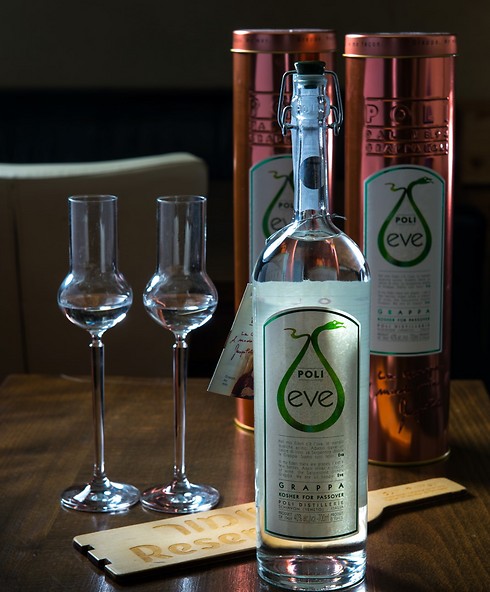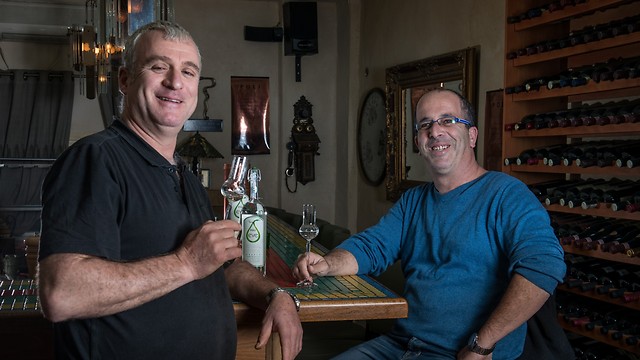
The world gets its first kosher grappa - and it's all about Eve
Israelis Avi Behar and Yoav Shimoni produce new brandy at height of its renaissance in Israel.
Only three people know exactly what ingredients make up the recipe of the famous Campari liqueur, the saying goes – the founder’s descendant, his business partner - and the rabbi.
Granted, the Milan-based drinks company has for many years had a complex ownership structure, which includes tens of thousands of employees, and yet in every joke there is a kernel of truth. In the case of Campari, it highlights the intimate relationship manufacturers in which must engage when they want to get a kosher stamp for their products.
If for liqueurs, wheat-based vodkas and whiskey, this boils down to a debate over whether to allow kashrut experts and rabbis into the depths of their factories - with wine, where the approval process is particularly rigorous, it is a painfully complicated process.
No one, besides the kashrut inspector or someone who keeps the Sabbath, may touch the tools used to decant the wine - and that includes the vintner. Kosher barrels of wine and brandy (mainly cognac) have to be kept in a closed location. Furthermore, in many cases there are separate bottling areas to those used for the rest of the wine produced at the winery or distillery. In short, it’s a headache.
It is because of this arduous process that it is extremely rare to find kosher cognac or champagne (notable exceptions are the producers Laurent Perrier, Pommery and Louis de Sacy, which also produce kosher for Passover champagne).
But when it came to grappa, which requires grape skins from Italy – there was no real kosher option. Until six months ago.
After years of work, experimentation and trials, Yoav Shimoni and Avi Behar this year launched the world's first kosher grappa – called Eve.
Kosher grappa reaches the shelves at the height of an impressive renaissance for the drink in Israel. This is one of the categories of beverages that has seen the greatest increase in consumption in restaurants and bars throughout the world - and especially in Israel. Until recently, it was a drink with an image problem, but now every self-respecting restaurant has at least two bottles of grappa in the storeroom.
Shimoni and Behar are now reaping the fruits of this newfound Israeli popularity. The two are the enthusiastic owners an import company that imports grappa to Israel, a business move that just a few years ago was viewed as a fool’s errand.
After bringing to Israel more than 300 different labels of grappa (Shimoni boasts of being the importer with the world’s most comprehensive portfolio of grappa, no less), the two decided to create a new, kosher grappa - the first of its kind in the world.
Eve, named for the first woman on earth, is distilled at the Poli family distillery - one of the most prestigious in the world - located in Veneto in northeastern Italy. It is distilled by Jacopo Poli from muscat grapes grown at a kosher vineyard in Tuscany, in a custom-made assembly line.
"We knew that this is a complex process, but honestly – both I and certainly not Poli had any idea how challenging it would ultimately be," says Shimoni, who himself keeps kosher.
"During the distilling process, Poli works with his brother for a whole month in round-the-clock shifts of 12 hours, seven days a week. He did not understand why one Saturday morning the supervisors never arrived. He waited and waited, for us and for them, and eventually called to find out what happened to them. So we explained it to him," he says, laughing.
Given that grappa requires fresh grape skins, any mistake or hitch could render the annual harvest utterly unusable.
"We were on the verge of despair after one vintage was lost because the cork flew off and the liquid ended up as a libation, and the product of another harvest went down the drain when a worker placed it on top of the boiler. But the third time - after we'd solved unexpected last-minute problems regarding kashrut - we finally succeeded in our mission," says Shimoni.
Indeed, last May Eve grappa finally hit the glass. The first 8,000 bottles of the grappa were bottled last year, after winning a stringent kashrut certification from Beit Yosef (as well as certificates from the American Union of Orthodox Rabbis and Milan's rabbinate). The kosher certificate is proudly displayed on the bottles, alongside a drawing of a snake, a symbol of the story of Eve for whom the wine is named.
So how does it taste? The muscato grape skins produce a delicate, aromatic and floral grappa, which seems perfectly tailored to the Israeli preference for the sweet over the sharp. It's a good match for the market.
Eve is available in elite wine stores (for about NIS 369) and is likely to have some competition soon. Alongside Shimoni and Behar, at least two more versions of kosher grappas are in the pipeline including one aged in the barrel. Keep an eye out.












